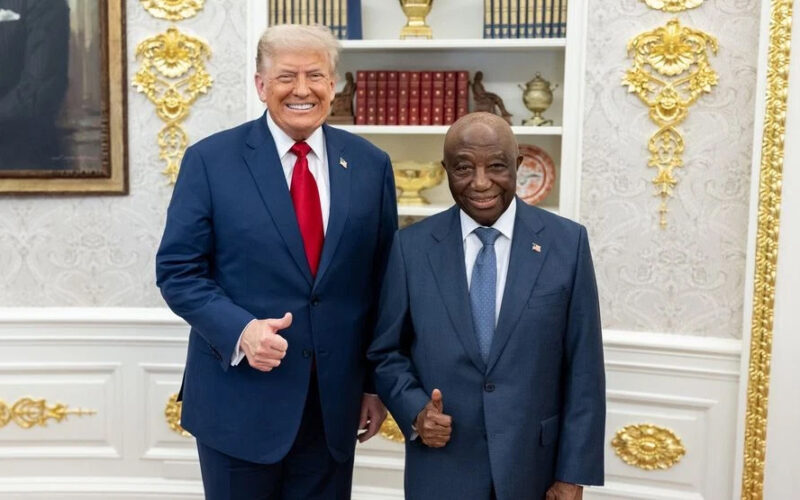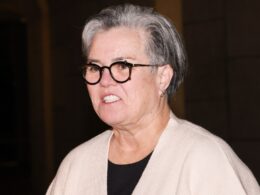Several years ago, I did a research project about Black Americans who had served in the Peace Corps in Africa in the 1960s and 1970s. Many of them sought refuge from white racism in the United States. But when they got to Africa, they discovered prejudice of a different kind.
In Liberia, especially, the Peace Corps volunteers were repulsed by the ways that Americo-Liberians — the descendants of the Black Americans who founded the country — oppressed indigenous ethnic groups. “They were as ‘racist’ as many whites I had encountered,” wrote one Black volunteer, who had grown up in the Jim Crow South. “The discriminatory system in Liberia reminded me of racism and segregation in Alabama.”
And part of that legacy was requiring everyone to learn English.
I thought of this history last week, when President Trump praised Liberian President Joseph Boakai for speaking “beautiful English.” Asked where Boakai learned it, Trump seemed surprised by his answer.
“In Liberia? Well, that’s very interesting,” Trump said, at a White House meeting with five African leaders. “I have some people at this table can’t speak nearly as well.”
The internet lit up with ridicule for our history-challenged president, who seemed unaware that Liberia was started mostly by Black Americans who had been enslaved. Or that its capital, Monrovia, is named after American President James Monroe.
Or that its official language is English.
But there was also something distorted about the ritual denunciations of Trump, which inevitably invoked the specter of white colonialism. And that might be a bit colonialist in its own right.
“His surprise at Boakai’s English fits a long imperial pattern,” wrote Al Jazeera columnist Tafi Mhaka, blasting Trump. “Africans who ‘master’ the coloniser’s language are often not seen as complex, multilingual intellectuals, but as subordinates who’ve absorbed the dominant culture.”
That imposes Western intellectual categories on Africans, which is also a long imperial pattern. In Liberia, Black people were the “colonisers.” They forced their dominant culture on other Black people.
That was because indigenous Africans weren’t Christian and didn’t speak English. So the America-Liberians resolved to spread civilization — as they understood it — to the benighted natives.
According to Alexander Crummell, a Black American who became one of the leading figures in the country, Americo-Liberians would spread “those habits of honesty, that purity of manners, and morals, those domestic virtues, and that evangelical piety, which are peculiarly the attributes of Anglo-Saxon society, states, and homes.”
And the best way to promote those values was via English, which “places the native man above his ignorant fellows and gives him some of the dignity of civilization,” Crummell wrote in 1860. “New ideas are caught up; new habits are formed, and superior and elevating wants are daily increased.”
Americo-Liberians would dominate the country for the next century. Its first 10 presidents were born in the United States. Although they made up just 5% of the population in the nation’s early years, Americo-Liberians controlled every aspect of its life: politics, economics, and especially education.
That started to change in the 1960s, when decolonization movements across Africa made it hard to justify Liberia as a strictly American outpost. Under President William Tubman, schools began teaching African history. Styles of dress changed, too, as Liberians started wearing gowns and robes instead of Western-style suits and dresses.
But English remained. Following a short experiment in teaching indigenous languages, Tubman ordered schools to focus more heavily on the country’s national tongue. “We’ve had these tribal languages for years — and where have they gotten us?” Tubman asked. “We must know English!”
Today, Americo-Liberians are significantly less dominant than before. Boakai, the current president, is from the Kissi ethnic group. He can read and write in that group’s language, but he converses in English.
If Trump understood anything about Liberia, he would not have been surprised by that. His remarks were deeply condescending. It is appalling — and embarrassing — that the United States is governed by such an ignorant human being.
But it’s also a mistake to read this episode through a simplistic white-colonial lens, where Westerners are the oppressors and Africans their victims. That condescends to Liberians, too, because it ignores their complex history of colonizing each other.
Americo-Liberians resembled “the masses of rude natives around them” but spoke “the refined and cultivated English language,” Crummell wrote in 1860. Last week, Trump said almost the same thing. He just didn’t know it.
Zimmerman teaches education and history at the University of Pennsylvania and serves on the advisory board of the Albert Lepage Center for History in the Public Interest.








